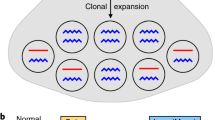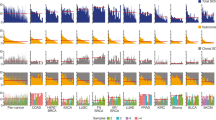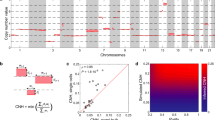Abstract
The analysis of loss of heterozygosity (LOH) is perhaps the most widely used technique in cancer genetics. In primary tumors, however, the analysis of LOH is fraught with technical problems that have limited its reproducibility and interpretation. In particular, tumors are mixtures of neoplastic and nonneoplastic cells, and the DNA from the nonneoplastic cells can mask LOH. We here describe a new experimental approach, involving two components, to overcome these problems. First, a form of digital PCR1 was employed to directly count, one by one, the number of each of the two alleles in tumor samples. Second, Bayesian-type likelihood methods were used to measure the strength of the evidence for the allele distribution being different from normal. This approach imparts a rigorous statistical basis to LOH analyses, and should be able to provide more reliable information than heretofore possible in LOH studies of diverse tumor types.
This is a preview of subscription content, access via your institution
Access options
Subscribe to this journal
Receive 12 print issues and online access
$209.00 per year
only $17.42 per issue
Buy this article
- Purchase on Springer Link
- Instant access to full article PDF
Prices may be subject to local taxes which are calculated during checkout



Similar content being viewed by others
References
Vogelstein, B. & Kinzler, K.W. Digital PCR. Proc. Natl. Acad. Sci. USA 96, 9236– 9241 (1999).
Jen, J. et al. Allelic loss of chromosome 18q and prognosis in colorectal cancer . N. Engl. J. Med. 331, 213– 221 (1994).
Ogunbiyi, O.A. et al. Confirmation that chromosome 18q allelic loss in colon cancer is a prognostic indicator. J. Clin. Oncol. 16, 427–433 (1998).
Martinez-Lopez, E. et al. Allelic loss on chromosome 18q as a prognostic marker in stage II colorectal cancer. Gastroenterology 114, 1180–1187 (1998).
Royall, R. Statistical evidence: a likelihood primer. (Chapman and Hall, London; 1997).
Wald, A. Sequential analysis. (Wiley, New York; 1947).
Thiagalingam, S. Evaluation of chromosome 18q in colorectal cancers. Nat. Genet. 13, 343–346 ( 1996).
Muleris, M., Salmon, R.J., Zafrani, B., Girodet, J. & Dutrillaux, B. Consistent deficiencies of chromosome 18 and of the short arm of chromosome 17 in eleven cases of human large bowel cancer: a possible recessive determinism. Ann. Genet. 28, 206–213 (1985).
Monpezat, J.P. et al. Loss of alleles on chromosome 18 and on the short arm of chromosome 17 in polyploid colorectal carcinomas. Int. J. Cancer 41, 404–408 (1988).
Sunderland, D.A. The significance of vein invasion by cancer of the rectum and sigmoid. Cancer 2, 429–437 ( 1949).
Kiyoaki, O. et al. Histologic features and clinical significance of venous invasion in colorectal carcinoma with hepatic metastasis. Cancer 78, 2313–2317 (1996).
Fearon, E. R. et al. Identification of a chromosome 18q gene that is altered in colorectal cancers. Science 247, 49–56 (1990).
Shibata, D. et al. The DCC protein and prognosis in colorectal cancer. N. Engl. J. Med. 335, 1727–1732 (1996).
Hahn, S.A. et al. Dpc4, a candidate tumor suppressor gene at human chromosome 18q21.1. Science 271, 350– 353 (1996).
Liu, J. et al. Loss of heterozygosity in tumor cells requires re-evaluation: the data are biased by the size-dependent differential sensitivity of allele detection . FEBS Lett. 462, 121–128 (1999).
Lindblad-Toh, K. et al. Loss-of-heterozygosity analysis of small-cell lung carcinomas using single-nucleotide polymorphism arrays. Nat. Biotechnol. 18, 1001–1005 (2000).
Boland, C.R. et al. A National Cancer Institute Workshop on Microsatellite Instability for cancer detection and familial predisposition: development of international criteria for the determination of microsatellite instability in colorectal cancer. Cancer Res. 58, 5248– 5257 (1998).
Krasna, M.J., Flancbaum, L., Cody, R.P., Shneibaum, S. & Ben Ari, G. Vascular and neural invasion in colorectal carcinoma. Incidence and prognostic significance. Cancer 61, 1018–1023 ( 1988).
Ouchi, K. et al. Histologic features and clinical significance of venous invasion in colorectal carcinoma with hepatic metastasis. Cancer 78, 2313–2317 (1996).
Tyagi, S., Bratu, D.P. & Kramer, F.R. Multicolor molecular beacons for allele discrimination . Nat. Biotechnol. 16, 49– 53 (1998).
Acknowledgements
This work is supported by NIH grant CA62924 and CA43460. Under a licensing agreement between the Johns Hopkins University and EXACT Laboratories, Inc., Digital PCR technology was licensed to EXACT, and Drs. Vogelstein and Kinzler are entitled to a share of royalties received by the University from sales of the licensed technology. The terms of these arrangements are being managed by the university in accordance with its conflict of interest policies.
Author information
Authors and Affiliations
Corresponding author
Rights and permissions
About this article
Cite this article
Zhou, W., Galizia, G., Goodman, S. et al. Counting alleles reveals a connection between chromosome 18q loss and vascular invasion. Nat Biotechnol 19, 78–81 (2001). https://doi.org/10.1038/83572
Received:
Accepted:
Issue Date:
DOI: https://doi.org/10.1038/83572
This article is cited by
-
Interrogation of genomes by molecular copy-number counting (MCC)
Nature Methods (2006)
-
Adjuvant chemotherapy for stage II colorectal cancer: the time is right!
Nature Clinical Practice Oncology (2005)
-
Gene Expression Profiling of Nonneoplastic Mucosa May Predict Clinical Outcome of Colon Cancer Patients
Diseases of the Colon & Rectum (2005)
-
Small changes in expression affect predisposition to tumorigenesis
Nature Genetics (2002)



